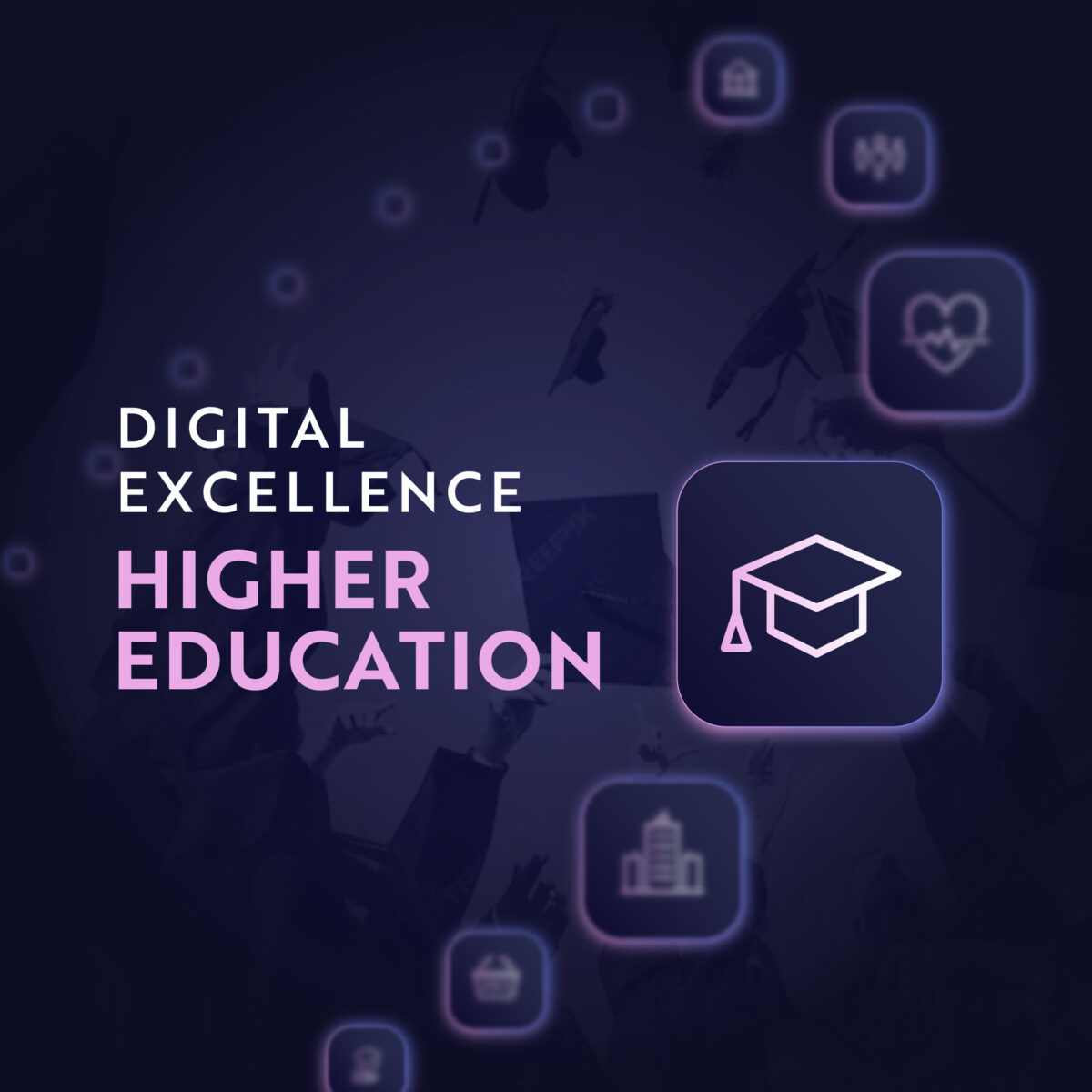
Key Technologies Transforming Digital Excellence in Higher Education
- Artificial Intelligence (AI) and Machine Learning:
- Adaptive Learning Platforms: AI-driven platforms personalize learning experiences by adapting content and pacing to individual student needs, enhancing engagement and outcomes.
- Predictive Analytics: AI analytics forecast student performance and retention, enabling proactive interventions and personalized support.
- Learning Management Systems (LMS) and Online Learning:
- Flexible Learning Environments: LMS platforms facilitate the delivery of online and blended learning, providing students with flexible access to course materials and resources.
- Remote Collaboration: Online tools support virtual collaboration and communication, enhancing learning experiences and fostering community.
- Internet of Things (IoT):
- Smart Campus Solutions: IoT devices enable real-time monitoring and management of campus facilities, optimizing energy use, security, and maintenance.
- Student Experience Enhancement: IoT sensors track classroom occupancy, resource usage, and environmental conditions, improving student comfort and learning environments.
- Augmented Reality (AR) and Virtual Reality (VR):
- Immersive Learning Experiences: AR and VR technologies offer interactive simulations and virtual labs, enhancing experiential learning and engagement.
- Virtual Campus Tours: VR enables prospective students to explore campuses remotely, supporting recruitment and engagement efforts.
- Data Analytics and Big Data:
- Student Insights: Data analytics provide insights into student behavior, preferences, and needs, enabling more effective recruitment, retention, and support strategies.
- Institutional Performance: Analytics tools track key performance indicators (KPIs), helping institutions optimize operations and resource allocation.
Benefits and Challenges of Achieving Digital Excellence in Higher Education
- Benefits:
- Enhanced Learning Experiences: Digital technologies enable personalized, engaging, and flexible learning experiences, improving student satisfaction and outcomes.
- Operational Efficiency: Automation and data analytics streamline administrative processes, reduce costs, and improve resource allocation, optimizing institutional performance.
- Increased Accessibility: Online and blended learning solutions expand access to education, particularly for non-traditional and remote learners.
- Challenges:
- Technological Integration: Integrating new digital technologies with existing systems requires careful planning and investment, particularly for institutions with legacy infrastructure.
- Data Privacy and Security: The collection and use of sensitive student data raise privacy concerns, necessitating robust data protection measures and compliance with regulations.
- Cultural Resistance: Digital transformation requires a shift in mindset and culture, which can be challenging for institutions accustomed to traditional educational models.
Digital Excellence in Higher Education: Strong Use Cases
- AI-Driven Adaptive Learning:
- Institutions like Arizona State University use AI platforms to deliver personalized learning experiences, enhancing student engagement and academic success.
- Online Learning and Remote Collaboration:
- Universities such as Harvard offer online courses and virtual collaboration tools, providing flexible learning opportunities and supporting global engagement.
- IoT for Smart Campus Management:
- Colleges like Georgia Tech implement IoT solutions to optimize campus operations, enhancing sustainability and student experiences.
Compelling Case Studies
Georgia Tech: Smart Campus Initiative
Georgia Tech has implemented IoT-enabled smart campus solutions to enhance operational efficiency and sustainability. By leveraging IoT technology, Georgia Tech optimizes energy use, security, and maintenance, improving the overall student experience and setting a benchmark for smart campuses.
Arizona State University: AI for Adaptive Learning
Arizona State University utilizes AI-driven adaptive learning platforms to personalize the educational experience. By tailoring content and pacing to individual student needs, ASU enhances engagement and outcomes, demonstrating the potential of AI to transform higher education.
Main Recommendations
- Invest in AI and Online Learning Technologies:
- Prioritize investment in AI and online learning solutions to enhance personalization, engagement, and accessibility. Embrace data-driven decision-making to drive innovation and competitiveness.
- Enhance Student-Centric Services:
- Leverage digital platforms to offer personalized, convenient, and flexible educational experiences. Focus on improving student satisfaction and retention through innovative solutions.
- Utilize the Digital Maturity Index (DMI):
- Conduct regular DMI assessments to evaluate digital capabilities, identify gaps, and develop strategic roadmaps for transformation. Use these assessments to guide decision-making and prioritize initiatives.
- Strengthen Data Security and Compliance:
- Implement robust data protection measures and ensure compliance with industry standards and regulations. Develop a comprehensive cybersecurity strategy to safeguard sensitive student information.
- Foster a Culture of Innovation:
- Encourage a mindset of experimentation and agility within the institution. Support initiatives that drive digital transformation and empower faculty and staff to adapt to changing educational dynamics.
Conclusions
The higher education sector is undergoing a digital transformation that presents both challenges and opportunities. By embracing digital technologies and focusing on personalization and student engagement, institutions can unlock significant business value and maintain a competitive edge. Leaders must prioritize digital transformation initiatives and leverage tools like the Digital Maturity Index to guide their journey toward digital excellence in higher education. In doing so, they can drive sustainable growth and success while delivering exceptional educational experiences in a rapidly evolving academic landscape.


















